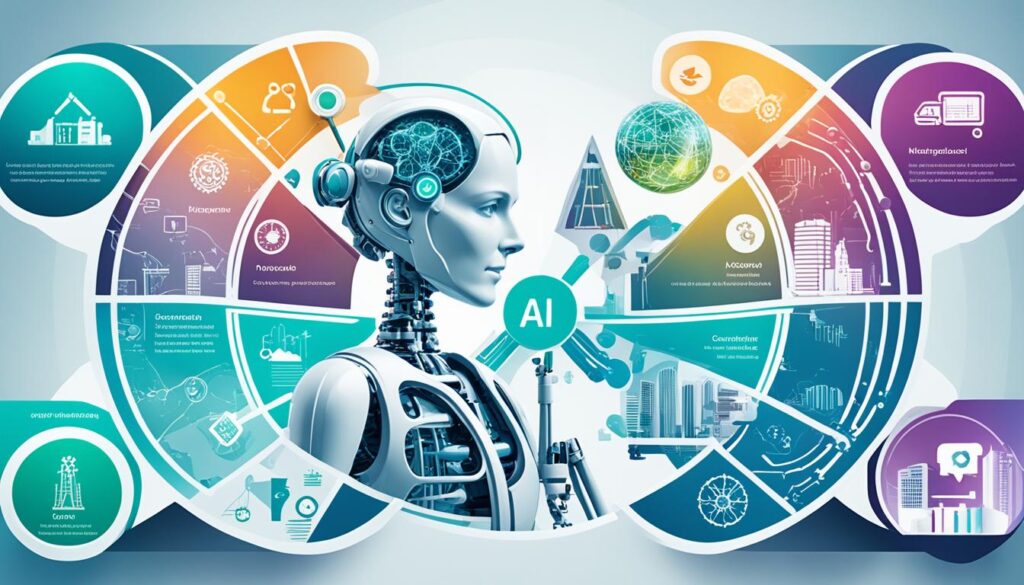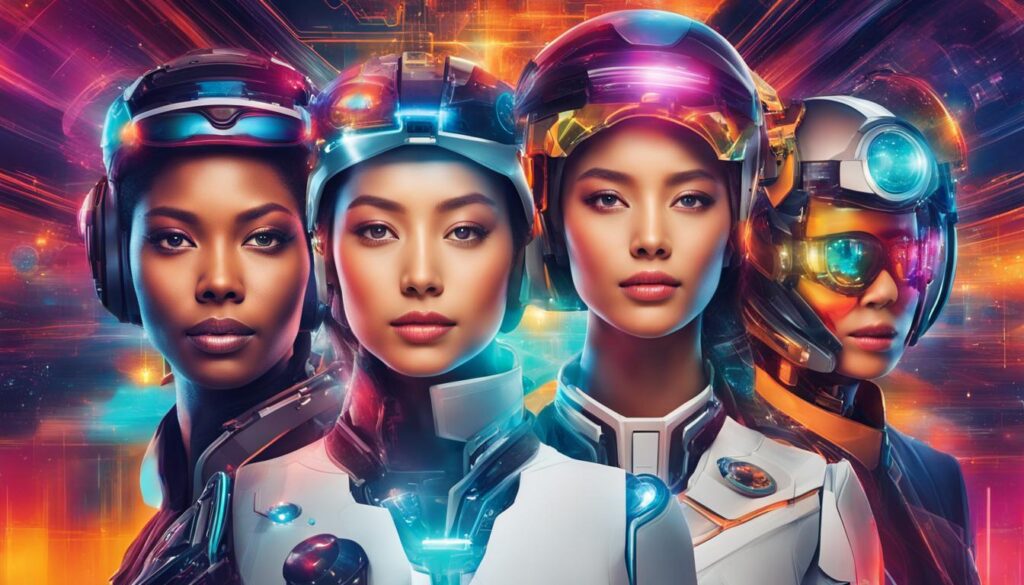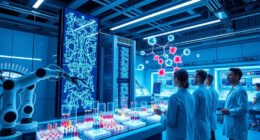Did you know that artificial intelligence (AI) is projected to potentially add up to $15.7 trillion to the global economy by 2030?
AI is not just a concept from science-fiction novels; it is a rapidly advancing technology that is already changing the way we live and work. From voice-activated virtual assistants to autonomous vehicles, AI is transforming various aspects of human life. But what is the impact of AI on humans, and what are the ethical implications of this technology?
In this article, we will explore the profound effects of AI on society, the economy, and governance. We will delve into the qualities of AI, its applications in diverse sectors, policy and regulatory issues, and the future of AI and humanity. By gaining a deeper understanding of AI’s influence on individuals and society, we can navigate the opportunities and challenges that this technology presents, and ensure responsible AI development.
Key Takeaways:
- AI is projected to have a global economic impact of up to $15.7 trillion by 2030.
- AI is transforming various aspects of human life, from virtual assistants to autonomous vehicles.
- Understanding the impact of AI on humans is crucial for navigating the ethical implications of this technology.
- We will explore the qualities of AI, its applications in diverse sectors, policy and regulatory issues, and the future of AI and humanity.
- Gaining a deeper understanding of AI’s influence on individuals and society allows us to ensure responsible AI development.
Qualities of Artificial Intelligence
Artificial intelligence (AI) possesses a unique set of qualities that enable it to make intentional decisions based on real-time data. These qualities, including intentionality, intelligence, and adaptability, contribute to the transformative nature of AI technology and its potential impact on human life.
AI algorithms are designed to mimic human intelligence, allowing them to analyze vast amounts of information and make sophisticated decisions. By utilizing machine learning and data analytics, AI algorithms have the ability to learn and adapt over time, constantly improving their performance.
“The beauty of AI lies in its intentionality. AI algorithms are purposefully crafted to process data in a way that enables them to make proactive decisions, rather than simply reacting to stimuli. This intentionality allows AI to exhibit a level of intelligence that is unmatched.”
Through machine learning techniques, AI can process and interpret complex data patterns that would be challenging for humans to analyze manually. This intelligence enables AI to identify trends, detect anomalies, and draw insights that can inform decision-making in various domains.
Furthermore, AI’s adaptability is a key quality that contributes to its versatility and effectiveness. As AI algorithms encounter new data and situations, they can modify their behavior and strategies to optimize outcomes. This adaptability ensures that AI technology remains responsive and effective in dynamic environments.
Understanding the qualities of AI is essential for comprehending its potential impact on human life and society as a whole. By harnessing the intentionality, intelligence, and adaptability of AI, we can unlock its full potential and leverage it to address complex problems and drive innovation in diverse fields.
| Qualities of Artificial Intelligence |
|---|
| Intentionality |
| Intelligence |
| Adaptability |
Intentionality
AI algorithms are purposefully designed to make intentional decisions based on real-time data, allowing them to take proactive action rather than being purely reactive.
Intelligence
AI possesses a high level of intelligence, enabling it to process vast amounts of information, analyze complex data patterns, and draw insights that inform decision-making processes.
Adaptability
AI algorithms have the ability to learn and adapt over time, modifying their behavior and strategies to optimize outcomes in dynamic and changing environments.
Applications in Diverse Sectors
Artificial intelligence (AI) is already revolutionizing various sectors, driving innovation and transforming the way we work. From finance to national security, healthcare to transportation, AI is making significant advancements and leaving a lasting impact on society. Let’s take a closer look at some of the key applications of AI in these diverse sectors:
Finance
AI is revolutionizing the finance industry, providing intelligent solutions for decision-making, personalized investment portfolios, and fraud detection. By analyzing vast amounts of financial data in real-time, AI algorithms can identify patterns, make accurate predictions, and optimize investment strategies.
National Security
In the realm of national security, AI plays a pivotal role in data analysis and video interpretation. It enables advanced surveillance systems to process massive volumes of information and identify potential threats, enhancing the effectiveness of security operations.
Healthcare
In healthcare, AI applications offer immense potential for improving patient care and outcomes. AI-powered algorithms can analyze medical data to support diagnoses, predict disease progression, and assist in the development of personalized treatment plans. Additionally, AI can streamline administrative tasks, optimizing resources and freeing up healthcare professionals to focus on patient care.
Criminal Justice
The criminal justice system is leveraging AI technology to enhance investigative processes, predictive policing, and crime prevention. AI algorithms can analyze vast amounts of data, such as crime patterns and demographics, to identify high-risk areas and potential threats. AI-powered tools also aid in forensic analysis, helping solve crimes more efficiently.
Transportation
AI is driving innovation in the transportation sector, enabling advancements in autonomous vehicles and smart transportation systems. AI algorithms enhance navigation, optimize traffic management, and improve overall road safety. Additionally, AI-powered logistics systems streamline supply chains, reducing costs and improving efficiency.
Smart Cities
AI plays a crucial role in the development of smart cities, where interconnected systems and data-driven insights are used to improve the quality of life for residents. AI applications in smart cities include intelligent energy management, waste management, traffic control, and public services optimization. Through AI, cities can become more sustainable, efficient, and responsive to the needs of their citizens.

As AI continues to evolve, its applications in diverse sectors will undoubtedly expand. The integration of AI technology enables us to tackle complex challenges, enhance efficiency, and make better-informed decisions across various industries.
Policy, Regulatory, and Ethical Issues
The integration of AI raises vital concerns in areas of policy, regulation, and ethics. As AI becomes increasingly prevalent in our society, it is crucial to address these issues to ensure the responsible and ethical development and use of AI technology.
Data Access Problems
One significant policy challenge is ensuring fair and equitable access to AI-generated data. The availability and quality of data play a crucial role in the development of AI algorithms and their outcomes. It is essential to establish policies that promote data sharing and prevent monopolies, allowing for broader participation and innovation in AI.
Algorithmic Bias
Algorithmic bias is another pressing concern in the realm of AI. As AI systems rely on data to make decisions, biases present in the training data can result in discriminatory outcomes. Addressing algorithmic bias requires developing clear guidelines and regulations to ensure that AI algorithms are fair, transparent, and free from prejudice.
AI Ethics and Transparency
Ensuring ethical AI development involves the establishment of rigorous guidelines and frameworks. Ethical considerations should encompass privacy protection, informed consent, and appropriate AI behavior in various contexts. Additionally, transparency in AI decision-making is crucial to gain the trust of users, regulators, and society at large.
Legal Liability for AI Decisions
The increasing autonomy of AI systems raises questions regarding legal liability for their decisions. Who should be held accountable when AI algorithms cause harm or make faulty judgments? Establishing clear legal frameworks and guidelines for accountability and liability in AI decision-making is crucial to address these challenges.
“Addressing policy, regulatory, and ethical concerns is essential to ensure the responsible and ethical development and use of AI technology.”
We must actively engage in discussions and debates surrounding policy and regulatory frameworks for AI development. Collaborative efforts involving government bodies, industry experts, and stakeholders are vital to strike the right balance between innovation and safeguarding human values.
Comparing Policy, Regulatory, and Ethical Issues
| Concerns | Solutions |
|---|---|
| Data Access Problems | Develop policies that promote data sharing and prevent monopolies, ensuring fair and equitable access to AI-generated data. |
| Algorithmic Bias | Establish clear guidelines and regulations to address biases in AI algorithms, ensuring fairness and transparency. |
| AI Ethics and Transparency | Develop ethical frameworks and guidelines, focusing on privacy protection, informed consent, and transparent AI decision-making. |
| Legal Liability for AI Decisions | Create legal frameworks and guidelines for assigning liability and accountability in AI decision-making processes. |
Addressing policy, regulatory, and ethical issues is vital to ensure the responsible and ethical development and use of AI technology. By implementing robust frameworks and guidelines, we can foster an AI-powered future that respects human values, promotes fairness, and mitigates potential risks.

Recommendations for Maximizing AI Benefits
To fully harness the benefits of artificial intelligence (AI) while mitigating its risks, several recommendations have been proposed. By implementing these recommendations, we can ensure responsible and ethical AI development.
Encouraging Greater Data Access: Access to high-quality, diverse datasets is crucial for AI development. Encouraging data sharing and collaboration among organizations can foster innovation and improve AI algorithms.
Increasing Government Funding in AI Research: Government support and investment in AI research are vital for advancing the field. Increased funding can spur breakthroughs, support academic institutions, and drive economic growth through technological advancements.
Promoting Digital Education and AI Workforce Development: As AI continues to transform industries, it’s important to equip individuals with the necessary skills. Promoting digital education programs and providing training opportunities for the workforce can ensure a smooth transition and create new job opportunities.
Creating a Federal AI Advisory Committee: Establishing an advisory committee comprising experts from academia, industry, and government can help shape effective AI policies. This committee can provide guidance on technological advancements, ethics, and regulation, fostering responsible AI development.
Engaging with State and Local Officials to Enact Effective Policies: Collaborating with state and local governments is crucial for creating regulatory frameworks that address the unique needs and challenges of AI integration. Policy coordination can promote consistency and provide a conducive environment for innovation.
Regulating Broad AI Principles: Developing clear guidelines and principles for AI development and deployment can ensure transparency, fairness, and accountability. Comprehensive regulation can address concerns such as privacy, algorithmic bias, and ethical decision-making.
Maintaining Mechanisms for Human Oversight and Control: While AI can automate processes and make decisions, maintaining human oversight and control is essential. Establishing mechanisms to monitor and audit AI systems can help prevent unintended consequences and ensure ethical use.
Penalizing Malicious AI Behavior: As AI becomes more advanced, it’s crucial to deter malicious activities and protect against cybersecurity threats. Implementing strict penalties for malicious AI behavior can discourage misuse and safeguard against potential harm.
Prioritizing Cybersecurity: With AI becoming increasingly integrated into our daily lives, cybersecurity measures must be prioritized. Proactive measures, such as robust encryption and authentication protocols, can safeguard against cyber threats and maintain data integrity.
Implementing these recommendations will help us maximize the benefits of AI and build a future where AI technology enhances human lives, while ensuring responsible development and safeguarding our values and security.

The Future of AI and Humanity
As AI continues to advance, it is important to consider its long-term implications for humanity. The rapid development and integration of AI technology have raised both excitement and concerns about the future. In this section, we will explore the potential risks and benefits of AI, delve into the evolving nature of human-ai interaction, and examine the societal consequences of widespread AI integration.

Potential Benefits of AI
AI has the potential to revolutionize various aspects of human life, offering numerous benefits to society. It can automate repetitive tasks, enhance productivity, and streamline operations across different industries. Furthermore, AI can assist in complex problem-solving, data analysis, and decision-making. It has the capability to process massive amounts of data and identify patterns that humans may not easily detect, leading to valuable insights and advancements.
Risks of AI
While AI presents great potential, it also brings inherent risks and challenges. One major concern is the potential job displacement caused by automation. As AI systems become more sophisticated, there is a possibility of certain job roles becoming obsolete. Additionally, there are ethical considerations surrounding AI, such as algorithmic bias and privacy concerns. It is crucial to address these risks and develop policies that ensure responsible AI development.
Human-AI Interaction
The interaction between humans and AI is evolving rapidly. From voice assistants to chatbots, AI is increasingly integrated into our daily lives. It is important to understand how humans interact with AI systems and how they can effectively collaborate to achieve optimal results. The design of user-friendly interfaces and intuitive interactions plays a vital role in facilitating seamless human-AI communication.
Societal Consequences of AI Integration
Widespread AI integration can have significant societal consequences. It can transform industries, reshape job markets, and impact economic systems. There is a need to carefully navigate these changes to ensure inclusive growth and minimize social inequalities. Additionally, ethical considerations around AI decision-making and accountability need to be addressed to maintain trust and transparency.
To summarize, the future of AI and humanity is intertwined. While there are potential risks, the benefits of AI are vast and present opportunities for innovation and progress. By understanding the evolving nature of human-ai interaction and the societal consequences of AI integration, we can shape policies and strategies that maximize the benefits of AI while mitigating potential harm. It is imperative to foster responsible AI development to ensure a future where AI enhances human well-being and society as a whole.
Ethical Concerns of AI
The impact of artificial intelligence (AI) raises significant ethical concerns that warrant careful consideration. As AI technologies continue to evolve and transform various industries, it is essential to address the potential ethical implications they bring. In this section, we will delve into some of the key ethical concerns associated with AI, including the impact on human values, job displacement, algorithmic bias, and social and economic inequalities.
AI and Human Values
One of the main ethical concerns surrounding AI is its impact on human values. As AI systems become more pervasive in our daily lives, there is a need to ensure that they align with our ethical principles and respect human dignity. The decisions made by AI algorithms must be transparent, explainable, and in line with the values and norms of society.
“The decisions made by AI algorithms must be transparent, explainable, and in line with the values and norms of society.”
AI and Job Displacement
Another ethical concern is the potential for job displacement due to AI automation. As AI technology advances, there is a risk that certain jobs may become obsolete, leading to unemployment and economic instability. It is crucial to address these concerns by implementing policies and strategies that promote job retraining and creation, ensuring a smooth transition in the labor market.
Algorithmic Bias
Algorithmic bias is a significant ethical issue associated with AI. AI algorithms are trained on vast amounts of data, and if that data is biased or reflects existing social and economic inequalities, it can perpetuate discriminatory practices. It is imperative to mitigate algorithmic bias and ensure fairness and equality in the decision-making processes of AI systems.
Social and Economic Inequalities
The integration of AI can potentially exacerbate social and economic inequalities. It is crucial to consider the impact of AI on marginalized communities and ensure that technological advancements do not widen existing gaps. Ethical AI development should focus on promoting inclusivity, diversity, and equitable access to AI technologies.

Addressing these ethical concerns is fundamental for fostering responsible AI development and ensuring that AI technologies contribute positively to society. By considering human values, minimizing job displacement, addressing algorithmic bias, and promoting social and economic equality, we can harness the benefits of AI while mitigating potential harms.
Human-AI Collaboration for Enhanced Performance
At [Company Name], we believe in harnessing the power of AI to complement human capabilities rather than replacing them. The collaboration between humans and AI has the potential to enhance performance and drive innovation across various industries.
One area where AI can make a significant impact is in information gathering and data crunching. AI algorithms have the ability to process massive amounts of data at incredible speeds, enabling humans to access valuable insights and make informed decisions more efficiently.
Furthermore, routine customer service tasks, such as answering frequently asked questions or handling simple queries, can be automated using AI-powered chatbots. This frees up human resources to focus on more complex customer needs, where empathy and critical thinking skills are essential.
AI can also play a crucial role in physical labor-intensive tasks. Robots equipped with AI capabilities can handle repetitive and laborious tasks with precision and efficiency, reducing the risk of human errors and improving productivity.
Enhancing Cognitive Skills and Creative Thinking
While AI excels at processing and analyzing data, humans possess unique cognitive skills and creative thinking abilities. By offloading data-intensive tasks to AI, humans can devote their time and expertise to higher-level activities that require critical thinking, problem-solving, and creativity.
Leadership is another aspect where humans excel. AI can assist in providing data-driven insights to inform decision-making processes, but it is human leaders who possess the vision, emotional intelligence, and strategic thinking necessary to guide organizations towards success.
Unlocking Human Skills and Potential
By collaborating with AI, humans can tap into their inherent strengths and unleash their full potential. With the assistance of AI, individuals can focus on developing and utilizing their uniquely human skills, such as emotional intelligence, complex problem-solving, adaptability, and effective communication.
It is crucial to foster a collaborative environment that encourages human-AI synergy. By working together, humans and AI can achieve remarkable outcomes that would be difficult to accomplish independently. This collaboration has the power to drive innovation, improve productivity, and revolutionize industries.

The Future of Human-AI Collaboration
The potential for human-AI collaboration is vast and exciting. As AI technology continues to evolve, we can expect even greater integration and cooperation between humans and AI. This collaboration will reshape industries, create new opportunities, and lead to groundbreaking advancements.
“The collaboration between humans and AI has the power to unlock unparalleled potential and drive innovation across industries.” – [Name], CEO of [Company Name]
By embracing the strengths of both humans and AI, we can navigate the evolving technological landscape responsibly and ethically. Together, we can harness the power of human-AI collaboration to shape a future that maximizes the benefits of AI while preserving our uniquely human skills, values, and well-being.
The Role of AI in Human Relationships
AI is revolutionizing not only industries but also the way we interact and form relationships with one another. From personal connections to social dynamics, the influence of AI is undeniable. In this section, we will examine the impact of AI on relationships, explore the challenges and opportunities it presents, and discuss how it is reshaping the dynamics of human connection.
Effects of AI on Relationships
AI has permeated various aspects of our lives, including our personal relationships. In the realm of romantic partnerships, AI-powered dating apps and algorithms help individuals find potential matches based on their preferences and compatibility. This technology has the potential to streamline the dating process and increase the chances of finding a compatible partner.
AI also plays a role in maintaining long-distance relationships. Through virtual assistants and video conferencing tools, individuals can stay connected with their loved ones regardless of geographical distance. This technology provides a sense of intimacy and enables couples to bridge the gap caused by physical separation.
Challenges and Opportunities
While AI brings numerous benefits to human relationships, it also presents challenges and considerations. One of the challenges is the potential for over-reliance on AI in decision-making. As AI algorithms become more advanced, there is a risk of individuals relying too heavily on AI recommendations instead of their own judgment, which can impact the authenticity and depth of human interactions.
On the other hand, AI provides opportunities for personalized and tailored experiences in relationships. Virtual assistants can offer suggestions for date nights or help plan surprises based on individual preferences. Additionally, AI-powered relationship coaching apps can provide guidance and support to couples seeking to improve their communication and strengthen their bond.
Reshaping Social Dynamics
The integration of AI in social dynamics has led to significant transformations. AI-powered social media algorithms curate personalized content feeds, influencing what individuals see and interact with. This can impact the way individuals form connections and engage in social discourse, as AI determines the content that reaches them.
Furthermore, the rise of AI-powered chatbots and virtual companions introduces a new dimension to human interaction. These AI systems can simulate conversation and provide emotional support. While some may find comfort in these virtual companions, it raises questions about the authenticity and depth of human relationships in an AI-driven world.
The Future of Human Connection
The role of AI in human relationships will continue to evolve as technology advances. It is essential for individuals and society as a whole to navigate this landscape with caution and mindfulness. Striking a balance between leveraging AI for its benefits while maintaining genuine human connection is crucial for the future of relationships.
Through conscious design and ethical considerations, we have the opportunity to shape AI in a way that enhances our relationships and preserves the essence of human connection. Embracing the potential of AI while staying grounded in our values and understanding the unique aspects of human interaction will be pivotal in creating a harmonious coexistence between humans and AI.

The Societal and Economic Impact of AI
As AI continues to integrate into various sectors, its impact on society and the economy cannot be ignored. The widespread adoption of AI technology brings about both significant opportunities and challenges that need to be carefully assessed and managed.
Societal Consequences of AI Integration
The integration of AI into society has profound implications on various aspects of human life. From the workplace to healthcare and even personal interactions, AI is reshaping societal dynamics. The potential benefits of AI technology, such as improved efficiency and enhanced decision-making, can lead to positive societal outcomes. However, it is essential to address potential risks and mitigate negative consequences.
AI has the capacity to displace certain job roles, leading to job displacement and economic disruptions. It is crucial to develop strategies to minimize the negative impact on individuals and communities, ensuring a smooth transition and retraining programs to equip workers with the skills demanded by the evolving job market.
Economic Impact of AI
The economic implications of AI are vast and transformative. AI has the potential to revolutionize industries, boost productivity, and spur innovation. By automating routine tasks, AI can free up human resources to focus on more complex and creative endeavors, ultimately driving economic growth.
Furthermore, the application of AI in sectors such as finance, healthcare, and transportation can lead to improved efficiency, cost reduction, and enhanced service delivery. However, it is important to address potential challenges, such as ensuring fair access to AI technologies and avoiding concentration of power in the hands of a few dominant players.
Job Displacement and the Future of Work
One of the major concerns surrounding AI integration is the potential displacement of jobs. As AI algorithms become more advanced, certain tasks and roles traditionally performed by humans may become automated. This raises questions about the future of work and the need for reskilling and upskilling programs to align the workforce with the demands of an AI-enabled world.
While job displacement is a valid concern, it is important to note that AI can also create new job opportunities. As AI technology evolves, there will be a growing need for professionals with expertise in developing, maintaining, and operating AI systems. By embracing AI technology and fostering a culture of lifelong learning, society can adapt to the changing nature of work.
Potential Benefits of AI Technology
Despite the challenges and uncertainties associated with AI integration, there are immense potential benefits that can be harnessed for the betterment of society. AI has the capability to improve the quality of healthcare, optimize transportation systems, enhance customer experiences, and advance scientific research.
For example, in healthcare, AI can assist in diagnosing diseases, analyzing medical images, and identifying patterns in large datasets, leading to more accurate and timely diagnoses. In transportation, AI can optimize traffic flow, reduce congestion, and enhance safety through predictive analytics. These potential benefits highlight the transformative power of AI when ethically and responsibly applied.
Risks of Artificial Intelligence
While AI offers numerous benefits, it also comes with inherent risks that must be addressed for responsible AI development. Ethical considerations, such as algorithmic bias, privacy concerns, and transparency in decision-making, need to be carefully handled to ensure fairness and equal opportunities.
AI systems must be designed to avoid discriminatory practices, protect user privacy, and be transparent in their decision-making processes. By implementing proper safeguards and regulations, society can harness the power of AI while minimizing potential risks and adverse consequences.
Societal Challenges of AI Integration
The integration of AI poses various societal challenges that need to be addressed proactively. These challenges include issues of data privacy, security, and the potential impact on social interactions and human well-being.
Additionally, the introduction of AI technologies may exacerbate existing social and economic inequalities. Efforts should be made to ensure access to AI benefits are equitable, and that vulnerable populations are not left behind.
To effectively manage the societal challenges of AI integration, interdisciplinary collaboration between policymakers, technology experts, researchers, and other stakeholders is essential. By working together, we can navigate the complexities of AI integration and make informed decisions that maximize its benefits while minimizing potential harms.
| Topic | Key Points |
|---|---|
| Societal Consequences of AI Integration | – Potential benefits and risks – Job displacement and economic disruptions – Addressing challenges for positive outcomes |
| Economic Impact of AI | – Industry revolution and increased productivity – Service delivery improvements – Ensuring fair access and avoiding concentration of power |
| Job Displacement and the Future of Work | – Concerns and opportunities – Reskilling and upskilling programs – Embracing AI and adapting to the changing job market |
| Potential Benefits of AI Technology | – Healthcare advancements – Transportation optimization – Customer experience enhancement – Scientific research advancements |
| Risks of Artificial Intelligence | – Ethical considerations and algorithmic bias – Privacy concerns and transparency – Safeguards and regulations |
| Societal Challenges of AI Integration | – Data privacy and security – Impact on social interactions and well-being – Addressing social and economic inequalities |

The Future of AI and Society
Looking ahead, there is immense potential for AI to shape the future of society. As technology continues to advance, it is crucial to explore the possibilities and challenges that lie ahead. In this section, we will discuss the future of AI and society, including the exciting concept of human-AI collaboration, the emergence of hybrid intelligence, and the importance of responsible AI development.
One of the most intriguing aspects of the future of AI is the idea of human-AI collaboration. Instead of viewing AI as a replacement for humans, we can harness its capabilities to complement our own. By working together with AI systems, we can achieve enhanced performance and improved outcomes in various domains. This collaboration allows us to leverage AI’s strengths in information gathering, data crunching, and routine tasks while freeing up human resources to focus on higher-level skills such as creative thinking, leadership, and complex problem-solving.
Hybrid intelligence, the combination of human and artificial intelligence, offers exciting possibilities for solving complex problems and achieving new heights of innovation. By merging the unique strengths of humans and AI algorithms, we can tackle challenges that neither can overcome alone. This hybrid approach enables us to benefit from AI’s speed, accuracy, and data-processing capabilities, while still incorporating human intuition, empathy, and contextual understanding. The synergy between humans and AI creates a powerful force that drives progress in various fields, from healthcare and finance to education and beyond.
However, the future of AI is not without its challenges. Responsible AI development is of utmost importance to ensure that AI systems are designed and deployed ethically, transparently, and in a manner that upholds human values and safeguards against potential risks. It is crucial to establish guidelines and regulations that address issues such as algorithmic bias, privacy concerns, legal accountability, and the potential impact on jobs and societal dynamics. By overcoming these challenges, we can pave the way for a future where AI serves as a force for good, contributing to human flourishing and societal well-being.

| Key Considerations for the Future of AI and Society | |
|---|---|
| Human-AI Collaboration | Emphasize the potential of collaboration between humans and AI to enhance performance and achieve better outcomes. |
| Hybrid Intelligence | Explore the concept of combining human and artificial intelligence to tackle complex problems and drive innovation. |
| Responsible AI Development | Highlight the importance of ethical and transparent AI development to address risks and ensure alignment with human values. |
Understanding the future of AI and society is vital for shaping policies, strategies, and frameworks that harness the full potential of this transformative technology while safeguarding our humanity. By embracing human-AI collaboration, exploring the possibilities of hybrid intelligence, and prioritizing responsible AI development, we can create a future where AI enhances our lives, empowers us to tackle complex challenges, and fosters a more inclusive and prosperous society.
Conclusion
The impact of AI on humans is vast and encompasses various aspects of our lives. Throughout this article, we have gained valuable insights into the qualities of AI, its applications across diverse sectors, policy and regulatory considerations, recommendations for maximizing its benefits, ethical concerns, human-AI collaboration, the role of AI in human relationships, societal and economic impacts, and the future of AI and society.
As AI continues to evolve, it is of utmost importance to prioritize responsible AI development and carefully consider its implications for humanity. By understanding the potential risks and benefits associated with AI, and taking proactive measures, we can create a future where AI enhances human life while preserving our values and well-being.
To achieve this, we must address policy, regulatory, and ethical issues related to AI. It is essential to implement effective measures and regulations to ensure transparency, fairness, and accountability in AI systems. Additionally, fostering collaboration between humans and AI can lead to enhanced performance and productivity, as AI complements our capabilities rather than replacing humans.
Looking ahead, the future of AI and humanity holds great promise. By harnessing AI’s potential, we can advance society and solve complex challenges. However, responsible AI development must be at the core of our endeavors. By navigating the path of responsible AI integration, we can shape a future where AI empowers us, improves our lives, and strengthens our connection with technology.
FAQ
What is the impact of AI on humans?
The impact of AI on humans is far-reaching and multifaceted. AI has the potential to significantly impact society, the economy, and governance. It is reshaping various aspects of human life, including sectors such as finance, national security, healthcare, criminal justice, transportation, and smart cities.
What are the qualities of artificial intelligence?
AI algorithms are designed to make intentional decisions based on real-time data, allowing for intelligent and adaptive behavior. These algorithms have the ability to learn and adapt as they make decisions, making use of machine learning and data analytics.
What are the applications of AI in diverse sectors?
AI is being integrated into various sectors, such as finance, national security, healthcare, criminal justice, transportation, and smart cities. In finance, AI is used for decision-making, personalized investment portfolios, and fraud detection. In national security, AI is employed for data analysis and video interpretation.
What are the policy, regulatory, and ethical issues associated with AI?
The integration of AI raises important concerns, including data access problems, algorithmic bias, AI ethics and transparency, and legal liability for AI decisions. These issues need to be addressed to ensure responsible and ethical AI development.
What are the recommendations for maximizing AI benefits?
To harness the benefits of AI while mitigating its risks, recommendations include encouraging greater data access, increasing government funding in AI research, promoting digital education and AI workforce development, creating a federal AI advisory committee, enacting effective policies, regulating AI principles, maintaining mechanisms for human oversight and control, and penalizing malicious AI behavior.
What is the future of AI and humanity?
The future of AI and humanity holds immense potential. It includes possibilities of human-AI collaboration, the concept of hybrid intelligence, and addressing the challenges for responsible AI development. Understanding the potential risks and benefits of AI is essential for shaping policies and strategies to maximize its benefits while minimizing potential harms.
What are the ethical concerns of AI?
Ethical concerns of AI include job displacement, algorithmic bias, and the exacerbation of social and economic inequalities. It is important to ensure that AI development aligns with human values and promotes fairness and equality.
How can AI enhance human performance?
Rather than viewing AI as a replacement for humans, there is recognition of the potential for human-AI collaboration to enhance performance. AI can assist in tasks such as information gathering, data crunching, routine customer service, and physical labor, allowing humans to focus on higher-level tasks that require cognitive skills, creative thinking, leadership, and other uniquely human capabilities.
What is the role of AI in human relationships?
AI is impacting human relationships, both personal and social. It presents challenges and opportunities in reshaping social dynamics. Understanding the role of AI in human relationships is crucial in navigating the evolving landscape of technology and its impact on human connection.
What is the societal and economic impact of AI?
The integration of AI into various sectors has significant societal and economic implications. It can bring about societal consequences, such as changes in job markets and economic structures. Understanding these impacts is essential for effectively managing and harnessing the power of AI in society.
What is the future of AI and society?
The future of AI and society includes exploring human-AI collaboration, the concept of hybrid intelligence, and the need to address challenges for responsible AI development. Understanding the future of AI and society is vital for ensuring positive outcomes and harnessing the full potential of this transformative technology.









